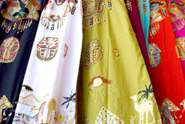In the west, Egyptian cotton has become a byword for luxury. No five-star hotel room in central London or downtown Manhattan is complete without starched white sheets from the Nile Valley. Sleep experts are waking up to the fact that, since we spend so much time sleeping, to make the most of this time the best quality bedding should be used, which bed linen manufacturers believe is Egyptian cotton.
With an established reputation of being the best cotton in the world, the products made with the Egyptian cotton – from bed linen (pillow cases, duvet covers, bedspreads, bed sheets, towels) to bathrobes and high street clothing – are the world’s finest. Marks & Spencer, John Lewis, Habitat, Ikea – they all carry luxury Egyptian cotton bed linen. In Britain alone the cotton business is worth billions.
The Rich Nile
World renowned for its softness and luxurious feel, Egyptian cotton sheets are made with Giza cotton grown on the Egyptian Nile delta for at least 7,000 years. The Nile River runs the entire length of Egypt and flows out into the Mediterranean Sea. The ancient Nile River Delta has, since prehistoric times, been exceptionally rich agricultural land. Arab merchants brought cotton cloth to Europe in as early as 800AD.
Today, in terms of cotton production, China, the US, India, Pakistan and Brazil are the world leaders, but in terms of prestige, nothing comes close to Egyptian cotton. Such a reputation is not unjustified. It’s renowned for producing fibres that are not only longer – sometimes an inch and a half long – than any other cotton fibre grown elsewhere, but are finer and stronger, as well. “For thousands of years – as far back as the pyramid building era or since the time of the pharaohs – Egyptians have slept under and worn products made of this fine cotton” says Ayman Gaballah, Managing Director of the Royal Egyptian Cotton store in Alexandria, Egypt. The Nile Delta was an excellent place to develop cotton plantations as Egypt has a moderate climate all year round, which is perfect for cotton.
“Its processing is also unique,” indicates Chaimaa Afifi of the Patco Trading Co., one of the largest Egyptian cotton exporters in Egypt. “All weeding is done by hand and fertilisers are primarily organic nitrates and phosphates. No chemical pesticide or defoliants are used which guarantees the highest levels of purity” says Afifi. In addition, hand picking puts no stress on the fibers – as opposed to mechanical picking – leaving the fibres straight and intact. Finally, after picking all the cotton, it is ginned by roller gins so as not to damage the perfectly formed fibres” adds Affifi.
Compared to the short, frayed, abused cotton strands produced by factory farms in other parts of the world, Egyptian cotton weaves into a strong, resilient, comfortable fabric. “The threads that are spun with the extra long variety are very fine and have greater elasticity, and serve to make exceptional soft bedding linen that surrenders one to its alluring touch. The strength of the fibre makes fabrics more solid and more resistant to stress that won’t easily break down, lint or pill” adds Gaballah.
All these factors have resulted in the Egyptian cotton fabrics being softer, finer and lasting longer than any other fabric in the world. Its ability to absorb liquids gives fabrics made of Egyptian cotton deeper, brighter and more resistant colours, as well.
Count Your Threads
To measure the level of smoothness combined with durability of the cotton, experts count the number of threads in a single square inch of fabric, which is called the “thread count” (TC), a term that Egyptian stores are surprisingly unfamiliar with. The reason is that the higher thread count Egyptian cotton sheets are typically produced in other countries and not in Egypt. The US and the UK are Egypt’s biggest cotton customers. The higher the thread count, the smoother, the heavier, the softer and more durable the fabric becomes. It even feels cool to touch. “Since with higher thread counts Egyptian cotton easily lends itself to being shapefd and beautifully transformed into bedding of all kinds than with other more inferior bed linen, most world class hotels and resorts boast about offering their guests Egyptian cotton sheets and pillows of more than 1200 TC which lends a heavenly soft feeling against the skin” says El Haj Yousef of ousef Cotton shop in Mahla, a large delta city south of Cairo.
You can’t really tell the difference in the feel of a 300 TC fabric and a 1200 TC fabric”, continues Affifi, “but the weight of the sheet set is a dead give away. We’ve handled a lot of bed sheets sets from different suppliers and their weight is very similar. A queen 1200 TC sheet set weighs about 8 to 9 pounds, while a queen 300 TC sheet set weighs only 4 to 5 pounds, and a queen 600 TC sheet set weighs about 6 to 7 pounds.”
“For daily use sheets, 200 to 220 TC per square inch is good enough,” says Gaballah, “but 300 to 400 TC per square inch is really in the luxury range. Bed linens with 1000 TC and above (make people) feel like royalty nestled in them.” The hotels actually save money in the long run by investing in the high thread counts sheets that become softer and smoother with repeated washings.
“Thread counts are important to our customers because they still equate high TC cottons with luxurious softness and comfort,” said Susan Sternthal, buyer/manager of the County Linen Centre, a 50-year old family run business in Doylestown, Pennsylvania. “However, we try to educate them about other important factors to consider besides thread count, like the weave and the finishing, so they understand exactly what the benefits are, what they’re paying for, and why.”
Take Care
Outlasting other cotton bed linen, which are generally part polyester, the sheets from the land of pharaohs may become an heirloom, if treated with a little extra care. When first purchased, the cotton sheets may feel a bit stiff but, after a few washes, one starts to feel the difference. Remember to take care of your top quality Egyptian sheets, as they will last as long for you as they did for Cleopatra.










